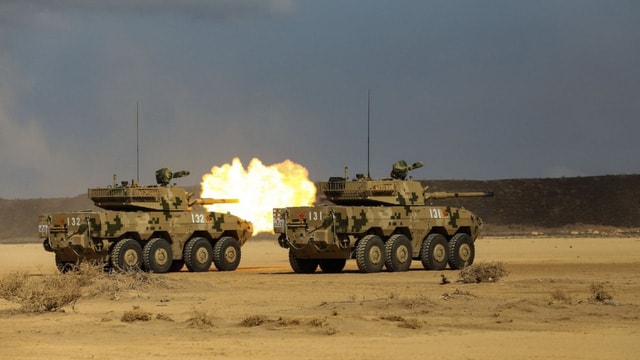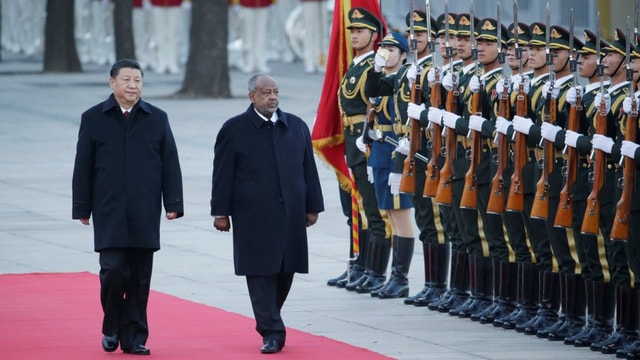China fires shots in Africa, signals its move to the open sea
China's overseas military base in Djibouti will be the first in a series of bases it will build to protect the economic interests of Chinese companies.
Africa will become China's factoryWhat is China's big investment in the base in Djibouti for? Worried about China, India jumps into Africa
 |
| Chinese armored vehicles participate in live-fire exercises in Djibouti last month - SCMP screenshot |
When Chinese soldiers fired the first symbolic shots at the Djibouti military base more than two months ago, they were also warning shots to the world that following Beijing's global expansion will be a powerful overseas military capable of ensuring everything runs smoothly.
That is the assessment of sources in the Chinese military with the daily newspaper.South China Morning PostHong Kong on December 18. China is indeed gradually building up the capacity for this "trump card" through direct and indirect channels to promote and seize interests abroad.
This is all the more important as more than 10,000 Chinese companies, 90% of which are privately owned, have invested in Africa following Beijing's "Belt and Road" initiative and Chinese President Xi Jinping's call to "go global".
Beijing-based military expert Zhou Chenming said lucrative investment projects and a "non-intervention" policy have also helped Beijing gain an advantage over some of its overseas rivals.
"Unlike the US, which often promotes 'freedom and democracy', China has never criticized the political and social systems of countries it invests in. China's goal is very clear: We just want to make money," explained expert Zhou.
According to China's Ministry of Commerce, China's exports to Africa in 2016 were worth more than $92 billion and imports from Africa to China were only about $60 billion, creating a trade surplus for China of $32 billion.
"Home field" abroad
Sources said the Djibouti base – China’s first overseas military base – would not be the country’s only overseas military base. Beijing is indeed ambitious to build more military bases in Africa, the Middle East and other regions to protect its growing interests in the Indian Ocean.
"China needs more overseas military bases because its growing interests are being challenged by some other countries and local armed forces," said an unnamed figure in the Chinese military.
This person said Djibouti is currently an ideal training location to assess the Chinese military's ability to use a variety of weapons and perform diverse missions in unsuitable humidity conditions and temperatures that regularly rise above 40 degrees Celsius.
Chinese troops have conducted at least two live-fire drills in the desert in Djibouti since September 22. Liang Yang, commander of the military base, said such exercises would help “explore a new training model for Chinese overseas garrisons”.
Notably, during the training session late last month in Djibouti, the Chinese military also deployed Type 095 and Type 90-II armored vehicles. Macau-based expert Antony Wong Dong described these as "the most advanced main battle armored vehicles in Africa."
Chinese weapons and personnel were brought to the military base in Djibouti in July this year by a flotilla consisting of the 25,000-ton Type 071 landing ship Jinggangshan and the 20,000-ton Donghaidao.
The Chinese government confirmed that construction of the base began in 2015. It will be China's first overseas naval base, although Beijing officially calls it a logistics facility.
 |
| Chinese President Xi Jinping meets with Djibouti President Ismail Omar Guelleh during Mr. Guelleh's visit to Beijing on November 23 - Photo: AFP |
The live-fire exercises in Djibouti will certainly help enhance the Chinese military's rapid response capabilities to challenges from hostile countries and armed forces that could harm China's growing national interests in Africa and the Middle East."
Earlier this year, Chinese military sources revealed that Beijing planned to increase the number of marines in its army fivefold, bringing the number to 100,000. Some of the new marines may be deployed to Djibouti.
Chinese media estimates the base in Djibouti can accommodate up to 10,000 troops. It is unclear how many troops China has deployed to the base.
The contract to maintain the base lasts for 10 years, with China paying 20 million USD each year.
Djibouti is located at the southern entrance to the Red Sea. It is sandwiched between Ethiopia, Eritrea and Somalia. It is also home to US, Japanese and French bases.
Indirect "training ground"
China's Xinhua news agency reported that the construction of the base and the deployment of Chinese military personnel was a joint decision between China and Djibouti. Beijing insisted that the "logistics supply base" would help UN peacekeeping missions, anti-piracy operations in the Gulf of Aden and off Somalia, and humanitarian relief efforts.
Military experts say these peacekeeping, anti-piracy and humanitarian missions are considered by the Chinese military as part of Military Operations Other Than War (MOOTW). And China intends to use them to enhance the capabilities of its soldiers in addition to direct training at bases.
Colonel Zhou Ba, director of the Center for International Security Cooperation under the Chinese Ministry of National Defense, said that to build a strong military that can operate abroad, China needs to carry out two basic tasks at present: One is to protect its growing overseas interests and the second is to take on more international responsibilities.
"Peacekeeping operations will help Chinese soldiers experience and learn how to deal with challenges they may never encounter at home," said Colonel Chu.
 |
| Chinese peacekeepers serving for the United Nations conduct live-fire drills in Gao city, Mali, on November 30 - Photo: PLA DAILY |
On November 30, Chinese peacekeepers serving with the United Nations in Mali also conducted a live-fire exercise following terrorist attacks that same month that left 15 people dead and 31 injured.
The exercise, dubbed "Yellow Sand Dunes," was conducted by the 5th squadron of Chinese soldiers. The photos were reportedPLA DailyChinese military photos posted show Chinese soldiers equipped with the new Type 95-1 assault rifle.
China has established a UN peacekeeping force of 8,000 troops following a pledge by Chinese President Xi Jinping in 2015. It is also the world's largest MOOTW contingent.
Mr. Xi also pledged to provide $100 million worth of military support for African Union (AU) peacekeeping missions and contribute $1 billion to the 10-year China-UN joint peace and development fund.
Colonel Zhou Ba said that peacekeeping missions are part of the responsibilities that Beijing has to shoulder as a permanent member of the United Nations Security Council. However, Zhou said that through this activity, the combat capabilities of Chinese soldiers will be improved.
"Peacekeeping missions have become one of China's trademarks, similar to Beijing's role in the Belt and Road Initiative and the Asian Infrastructure Investment Bank (AIIB). They show China's hard and soft power," said expert Li Jie.
Last year, China became the second-largest contributor to the UN peacekeeping budget, behind only the United States, and now has troops participating in six UN peacekeeping operations, which are in Mali, Liberia, South Sudan, Darfur, the Democratic Republic of Congo and sub-Saharan Africa.
According to TTO
| RELATED NEWS |
|---|
